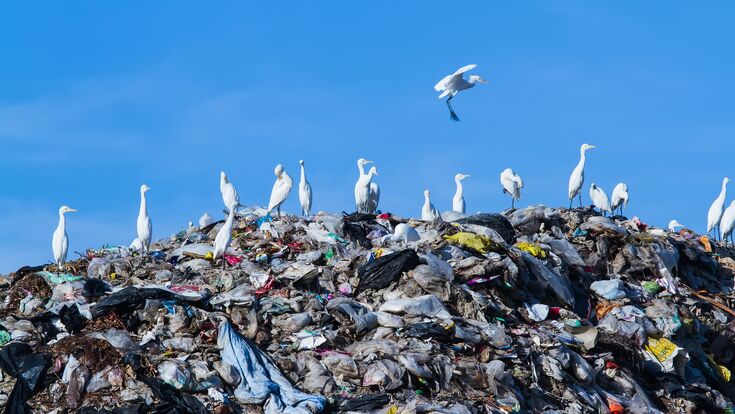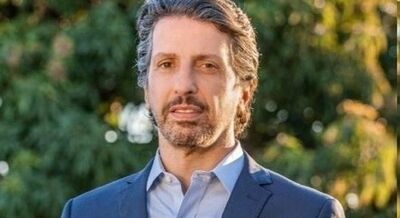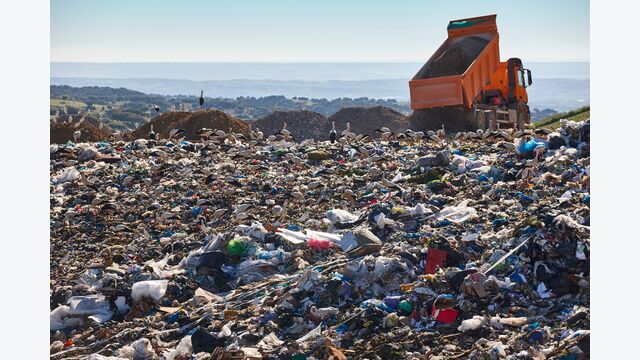Interview with Brazil's Environment Minister : Brazil's Joaquim Leite: “We must educate the population on waste and the environment”

Dramatically rising greenhouse gas emissions from the waste sector, marine littering, open dumpsites that are a hazard to public health, extremely low recycling rates: Brazil does have a waste problem. To tackle it, the government recently launched a series of measures.
The National Solid Waste Plan, ten years in the making, establishes strategies, guidelines and goals to improve waste management in the country, focusing on closing dumpsites and increasing recycling rates. Currently only 2.2 per cent of solid waste is recycled.
The closing of dumpsites has already been on the agenda for a few years. In 2018 the largest garbage dump in Latin America was shut down just outside the capital, Brasilia, and replaced with a modern landfill and sorting facility. Nearly a thousand former waste pickers, who previously lived on and from the dump, having no social insurance, have been trained to work in the facilities.
Another programme, Recicla+, which establishes the Recycling Credits Certificate (CCR), tackles mainly packaging waste but of course also recyclable product waste.
Furthermore, Brazil supports the growth of biomethane with its Metano Zero programme.
Environment Minister Joaquim Alvaro Pereira Leite talked to Waste Management World about Brazil’s waste problem and its strategies to deal with it.
Brazil still presents underdeveloped rates on adequate disposal, recycling and waste recovery. What are the plans for the future?
The federal administration has launched the Solid Waste Plan and that includes 55 per cent of waste in the course of the next 20 years. Furthermore, we have launched a national information system on solid waste featuring several different layers of information. The plan provides incentives to the private sector to develop projects based on their information, which ranges from waste production all the way up to collection and logistics and transportation of waste. In addition, the federal administration has launched an innovative, groundbreaking and unprecedented programme for recycling credits, the Recicla+ programme. This is roughly based on the carbon market agreement, whereby companies conduct a reverse auction to add value to waste, especially from packaging. We are therefore in a position to inject funds into the overall system to measure the economic feasibility of the overall recycling operations.

What investments are needed for these future projects?
For sanitation roughly USD 100 billion, for waste roughly USD 5 billion.
Could you describe the main points of the recently launched National Strategy for Solid Waste Management?
The main purpose is to shut down the dumpsites. We still have 2,700 dumpsites in Brazil. We have managed to successfully shut 20 per cent down in the last three years. We also want to establish a model to facilitate that goal, which consists in integrating the waste collection systems from different cities into one ecological park with a view to ensuring the economic feasibility of the process: not only the recycling but also the waste treatment process.
How is the waste management system organised? Is it only on a municipal level or is there a federal plan?
It works on a municipal level but is governed by federal-level policies, which provide a direction to be implemented at the local municipal level.
What are the challenges of implementing these new measures, especially regarding the population? How well are they being received? Is it difficult to change behaviour?
We must educate the Brazilian population on waste and the environment. But since we are a developing country, before we educate the population on waste and the environment we must provide them with literacy and numeracy skills. We have already launched awareness-raising campaigns particularly focusing on the appropriate disposal of packaging to combat marine litter.
We started the Recicla+ programme to focus especially on packaging products used by the population and the proper disposal of packaging as well as automotive batteries, electric and electronic appliances, lubricant oils and medications as a reverse logistics campaign.
The packaging used in agricultural chemicals is also a well-established case and has led to the return of 95 per cent of agricultural chemicals. As a result, Brazil is amongst the top countries when it comes to recycling agricultural chemical packaging as well as aluminium packaging, 99 per cent of which is fully recycled in Brazil. This amounted to 33 billion cans in 2021. We are ranked number one in the world.
Coming back to the Recicla+ programme, could you describe it in more detail?
The Recicla+ programme is anchored in the amount of packaging that importing or manufacturing countries sell in the Brazilian market. Market means by extension nature as a result. And because the packaging has no economic value per se, it is of course bought at a very low cost. And the waste pickers, the people who scavenge for waste packaging, must of course have an economic incentive to collect the packaging from the environment, as is the case with aluminium cans.
On the other hand, you of course have the companies that sold the packaging and that need to pay for the packaging to be removed from nature, as is precisely the case with agricultural chemicals. This is a project that has been under way in Brazil for more than 20 years. And it is a successful project where the different manufacturers have injected up to USD 40 million per year to promote the recycling system for agricultural chemical packaging, which has achieved the target of more than 95 per cent recycling.
Regarding Recicla+, the manufacturers of packaging hold a reverse auction and buy it back to add more value to the waste. Otherwise it will be thrown out into nature. The purpose is therefore to make sure they inject money into this chain in order to achieve the goals, as has been successfully achieved with aluminium cans and agricultural chemical packaging.
We must educate the Brazilian population on waste and the environment. But since we are a developing country, before we educate the population on waste and the environment we must provide them with literacy and numeracy skills.Joaquim Alvaro Pereira Leite
Regarding the waste pickers: basically, you also help to improve their level of income with this system?
That is precisely the case, yes. Imagine I was a waste picker: I would get an extra amount of money and with that surplus I can add 30 to 40 per cent to my monthly income. Waste pickers have an additional source of income. For instance, someone who works in an office building can leave the building at the end of the day with a given amount of packaging to deliver to an ecological collection point: an eco-point, as we call it. A food delivery company could also remove their packaging after the food has been delivered.
The Recicla+ programme has already held its first reverse auction. This is an unprecedented innovative initiative, unseen anywhere else in the world. It is a formula by which we assign responsibility to the sellers of the product, and those who are ultimately responsible for placing that packaging in nature. The companies are themselves not in a position to collect that waste, so they make the money available to be deducted from their recycling credits. At that point the companies will enter into a sector-wide agreement to make sure their goals can be achieved for each kind of waste.
Roughly speaking, it works just like the carbon market. If you release CO2 into the atmosphere, you must offset your emissions. The same is true of what we intend for plastic and glass. This means that the companies will be injecting money into this chain, which will in turn be in a position to collect more and more packaging and so you will be creating green job opportunities. This would be an additional source of income, not the person’s main occupation.
Brazil has also launched a methane credits system. How can this help to improve waste management in Brazil?
The federal government entered into the methane pledge at COP26, as was the case for more than 100 countries. Brazil is the world’s number one country to establish a specific methane development programme by reducing federal taxes to zero for the purchase of equipment and also for the setting up of biogas and biomethane plants. We have also included methane projects to benefit the international climate fund. And we have also established the innovative methane credits programme in Brazil’s regulated domestic carbon market, which was formally established at the end of May, as a result of which you will be able to trade methane-specific credits. When you introduce methane credits, it means you are bringing additional revenue for projects: projects that would otherwise not be economically feasible. And with the additional revenues from the methane credits, you are able to speed up the implementation of these projects and the overall development of such projects.
How important is biomethane for Brazil’s energy self-sufficiency?
Biomethane can replace diesel oil in up to 30 per cent of Brazilian domestic consumption, and ultimately eliminate diesel oil imports into Brazil while reducing overall methane emissions by up to 30 per cent as a result. Currently, Brazil taps into only 1.5 per cent of organic waste.
How many biomethane plants are planned or are necessary to reach this 30 per cent target?
Sugar and ethanol production plants currently have projects under way to the tune of roughly USD 5 to 7 billion. In addition to these large-scale sugar and ethanol projects, we will also have smaller projects related to the agribusiness industry: poultry raising, animal husbandry and dairy farming industries.
Is it hard to convince people to invest in projects like these?
No, it’s not, because these projects are economically feasible. Small farmers, for example, can treat their own waste and create additional revenue, and thus produce biofertiliser as a by-product.
Moving on to the topic of marine littering, what measures are in place or will be put in place in the future?
Brazil has recently signed an agreement with the UNEA-5 countries to eliminate marine litter. The programmes I have just described include programmes aimed at tackling marine litter (Recicla+), cleaner rivers (Rios mais limpos) and zero dumpsites (Lixão Zero). All of these programmes are fully in line with the recently established and signed agreement on the elimination of marine litter.
What role can waste to energy play in the future of waste management in Brazil?
Energy generation in Brazil is a very clean activity; 85 per cent of energy is clean or an energy mix. Today we already have 21 gigawatts of wind energy plus 14 gigawatts from solar energy. And we have actually set a deployment record in the past year for these plants. That is why waste-to-energy sources are not the most important sources in Brazil. But waste to energy does perform an important role in some cities to ensure that methane gas emissions can be avoided. Waste to energy is expected to expand in certain large cities.
Want to know more on waste to energy in Brazil? Click here!
Does waste to energy have a place in a circular economy?
Yes, it does perform a role in the circular economy as an add-on to recycling efforts. Depending on the project, of course, it will be necessary to derive energy from a portion of the waste and parts can be recycled, parts can ultimately be turned into biogas or biomethane. This means that it all depends on the overall conditions. And I think that all climate-smart solutions can operate together; these are profitable climate solutions that we are talking about.
About
Joaquim Alvaro Pereira Leite has been the Brazilian Minister of the Environment since June 2021. He had previously been responsible for the Amazon and Environmental Services Secretariat at the Ministry of the Environment.



